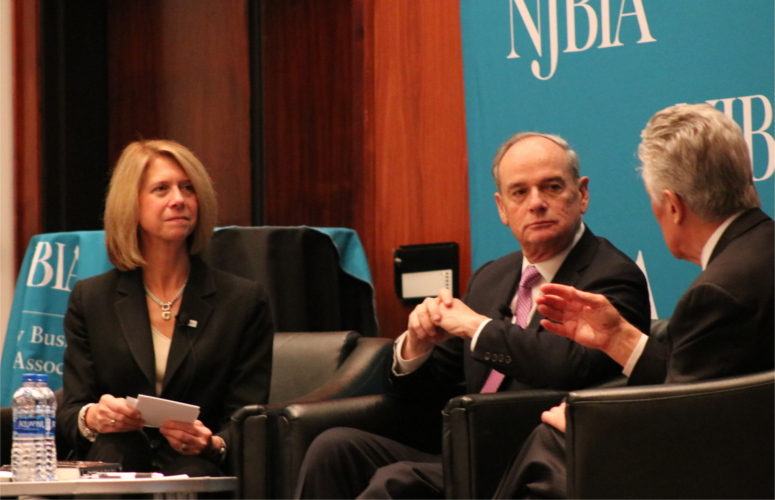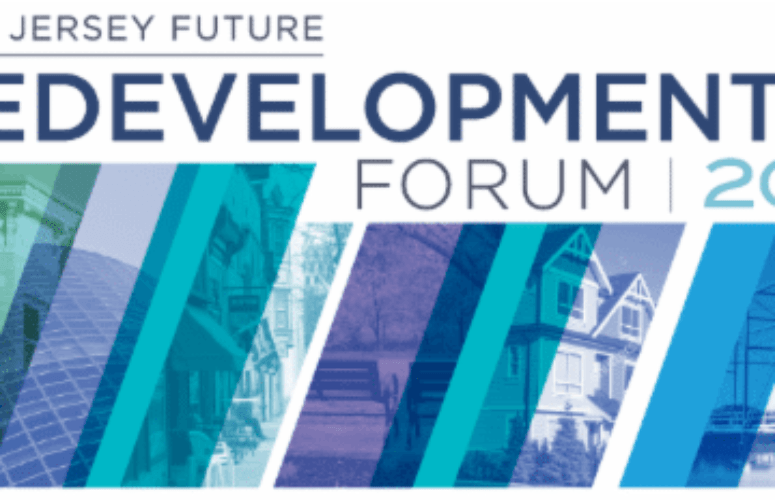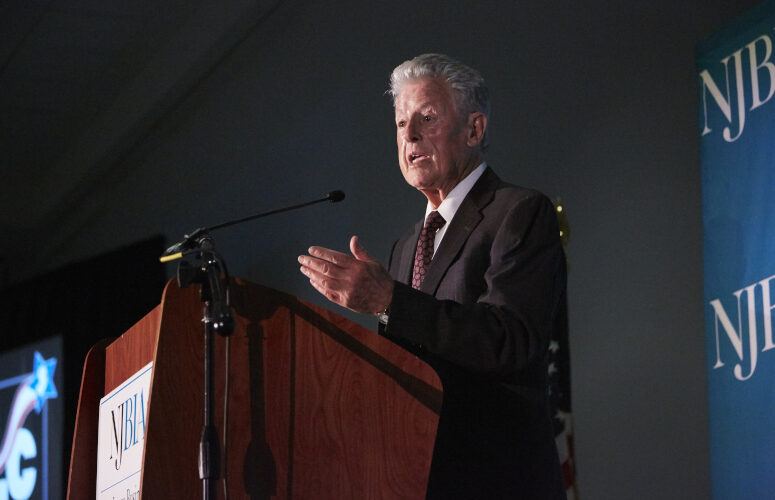
Two Former NJ Governors Offer Wisdom for Today
By George N. Saliba, Managing Editor On Dec 10, 2018While there have previously been eras of political and popular incivility since the United States began, partisanship in recent years has again measurably been increasing at the national level. This was true prior to the social and political divisions statistically felt – and reported by – most Americans following the 2016 presidential election.
Attendees at NJBIA’s Public Policy Forum on Friday, therefore, were treated to a reprieve from the hostilities when former New Jersey Governors Donald DiFrancesco and Jim Florio graced the stage at the Hyatt Regency New Brunswick. Michele Siekerka, NJBIA’s president and CEO, prodded the two leaders for wisdom across a broad range of topics.
Asked about the nation’s civil discourse now when compared to decades past, Governor Florio – also a former U.S. Navy boxer, law professor, U.S. Congressman, and now a practicing attorney – said, “It is not even the same world. The fact of the matter is that civility is gone. And I think prior to having a legislative accomplishment record in the United States Congress, [my accomplishments were] fairly substantial: The Pinelands [Protection Act], Superfund – a whole bunch of different things.”
He stressed, “Every one of those pieces of legislation got through with the active assistance of the Republican members of my committee. It was collaborative; there was a give and take, and now you don’t have that; that is really troubling. We are missing something.”
Governor DiFrancesco — the longest-serving New Jersey Senate President, the 51st governor, and the New Jersey governor at the helm during the September 11, 2001 terrorist attacks — echoed those sentiments.
He said, “I think a lot of it has to do with social media; we didn’t have that [when I was in office]. Social media polarizes political people, because they say and do things publicly that they would never do, before … That has contributed dramatically to the partisanship, I believe.”
Throughout the 30-minute discussion onstage, Florio’s new book, titled Standing on Principle: Lessons Learned in Public Life, was mentioned several times. Of his governing philosophies, he said, “It is interesting, because one of the book’s themes is that your life experiences do shape your values and principles. Likewise, your principles are shaped by the things you do; this [is a time] an opportunity to take advantage of that.”
He added, “The whole thought about how it is that we deal with these problems [facing society] is something that is very important, as well. Getting engaged and involved is really another key theme; talking about how real people become engaged in the process, because it is called participatory democracy; the system doesn’t work, unless we work to make it work.”
During his gubernatorial term, Florio arrived to discover the state financially distressed with $3 billion in debt, and he first had to make cuts to government (which people protested), followed by raising taxes – a famously unpopular but, some argue, a necessary step.
Florio noted that his administration was the last one to make full pension payments.
Meanwhile, providing a panoramic view of politics, DiFrancesco asserted, “The [U.S.] Senate is a great club because we have no clue what these people are doing on a day-to-day basis. [In contrast,] when you are governor, every day the press wants to know what you are doing, why you are doing it, and where you are going. It is a huge difference; it is a huge responsibility representing the state. Every day, something happens where you have to involve your staff, your cabinet, or your state employees, on some issue … 9/11 being, of course, the best example, for me … It is a lot different from being a legislator and sitting back and saying, ‘You know, I will vote for this; I am not going to vote for this.”
Florio said, “Congressmen focus on their committee, and you heard [Congressman Frank Pallone, who spoke at the Public Policy Forum] focus on his committee. And that’s where you can really go in-depth, and I am very comfortable with that sort of approach. As Governor, you have a far aim across the board, but you have to rely on other people for the depth because you just can’t afford to go into things in great depth. But, the difference between the legislator and executive is dramatic – but, also intriguing, in some respects.”
The Public Policy Forum was complete with discussions surrounding the “structural” problems the state faces, including – but not limited to – pension funding problems and health insurance funding issues.
Florio concluded, “Fast forward to today, and the state pension system is not funded to the tune of almost $60 billion. Again, nothing is for nothing, and you have to make some decisions about what you want to cut. You can’t cut $60 billion, because the budget is, like, only $37 billion.
“We have a structural problem [in New Jersey] that almost defies description, regarding how we are going to cope with it. Someday, if we have a couple of hours, I will give you my thoughts regarding how we are going to solve it … I am anticipating that within the next 10 years, it will be a situation where every Governor in the United States – because New Jersey is not the worst off; other states are worse off than we are – but, every Governor in the nation will go to Washington.
“Whoever the president is, they will be saying, ‘Here are the keys to my statehouse. I can’t deal it with, anymore. You are going to have to deal with it in a different way.”
CORRECTION: Saturday’s NJBT article titled “Will Businesses Succeed in New Jersey’s Environment?” incorrectly quoted Walter Brasch of Prager Metis CPAs. He was referring to New Jersey’s annual audit report titled “Comprehensive Annual Financial Report” (CAFR), and not the state’s budget. The corrected article may be found here.
To access more business news, visit NJB News Now.
Related Articles:





